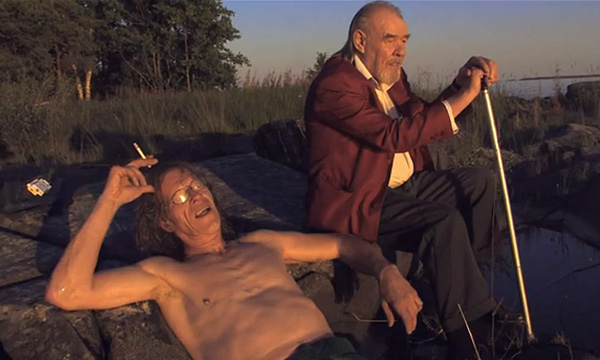Films about indigent street musicians have their special appeal. Street musicians are, despite their excruciatingly uncool outward aspect, able to emanate the sort of aura you’d expect from old minstrels, with all the good and the bad it involves. Films like the recent Once demonstrate the audience has a soft spot for stories revolving around artists that have yet to be recognized despite the passion they have for their art. Street musicians remind the public that not the whole music business is soaked in money and glamour and that for some less fortunate performers life is often dotted with constant difficulties. Just devoting oneself to an art definitely doesn’t pay in many cases, and sometimes reaching the top is only a question of smartly constructing a stage persona and being able to sell it. For a strange paradox, in a sight-driven society like ours, image is everything also for the artist of sounds. Musicians don’t necessarily have to sound convincing, but they have to look persuasive and to find the right strategies to promote themselves.
Janos (Sven-Olof Molin) is one of the unfortunate performers I was talking about a few lines above. He’s probably a man in his late fifties, but his appearance is that of a man who could as well be much older. Janos is a performer in the most accurate meaning of the term: it doesn’t really matter to him whether his audience is paying or not to listen to him; he doesn’t even care if the audience is actually listening to him; singing and playing the guitar are for him vital needs. His way of doing things though is not always supported and understood, so he occasionally finds himself in trouble. Janos’ bohemian lifestyle is strongly opposed by his self-proclaimed manager and best friend, an old and lame man named Stig Manner (Rolf G. Ekroth). Stig makes a living selling and buying discarded items to flea markets and junk dealers. He has problems of his own – his difficult relationship with his daughter and his severely unstable health among others – but he is hopeful that with his help Janos will make it in the show business. His tastes and his ideas are questionable, almost ridiculous at times, but his interest in Janos’ music is sincere. Both Janos and Stig are rather pathetic characters from the outside, but on the inside they are like any other: they are sensitive and lonely and they need at times to know the world accepts and likes them. Janos and Stig are two losers whose presence is barely acknowledged by society, but at least they have one another.



Song of Tomorrow is an unassuming depiction of a contemporary social malaise. Individuals like Janos and Stig, living at the borders of society, often making a living in questionable and mortifying ways, are something even the most successful and civilized societies, like the ones of the Northern European countries, tend to consciously remove from their scope. Outcasts or faulty people, although they occupy the same spaces as normal citizens and have their same needs, are often on their own. But Song of Tomorrow is also the story of a friendship: private human values can sometimes overcome and make up for society’s misdeeds.
The direction of Song of Tomorrow wouldn’t have worked with another film as properly. The low-key style and the use of hand-held camera the entire time contribute to emphasize the subdued tone of the material of the story. The plot is very minimal and the film is primarily character-based. The interactions of Stig and Janos are in focus all the time. The personal experiences of the two men are not given away in full, but only through a few lines of dialogue or through details: a good choice to avoid banal solutions that would have definitely cheapened the film. The acting is excellent. Both Olin and Ekroth, the main actors, deliver extremely believable performances and they blend very well together. A film like Song of Tomorrow, if made by a bigger production and in a Hollywood style, would have been the usual nauseating tear-jerker; instead, Bergergård and Holmström offer to the audience a well-balanced little movie.
Song of Tomorrow is in competition at this year’s RIFF in the category New Visions.
Title: Framtidens Melodi (Song of Tomorrow)
Year: 2010
Director: Jonas Bergergård, Jonas Holmström
Genre: Drama
Country: Sweden
Runtime: 84 minutes
Language: Swedish